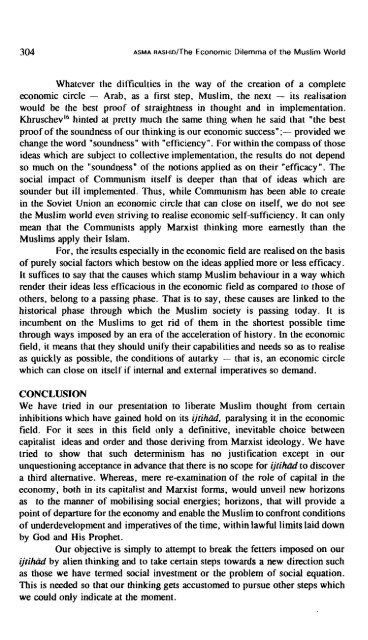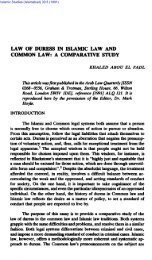THE ECONOMIC DILEMMA OF THE MUSLIM WORLD
THE ECONOMIC DILEMMA OF THE MUSLIM WORLD
THE ECONOMIC DILEMMA OF THE MUSLIM WORLD
You also want an ePaper? Increase the reach of your titles
YUMPU automatically turns print PDFs into web optimized ePapers that Google loves.
ASMA RASHID/T~~ Economic Dilemma of the Muslim World<br />
Whatever the difficulties in the way of the creation of a complete<br />
economic circle - Arab, as a first step, Muslim, the next - its realisation<br />
would be the best proof of straightness in thought and in implementation.<br />
Khruschev16 hinted at pretty much the same thing when he said that "the best<br />
proof of the soundness of our thinking is our economic success";- provided we<br />
change the word "soundness" with "efficiency". For within the compass of those<br />
ideas which are subject to collective implementation, the results do not depend<br />
so much on the "soundness" of the notions applied as on their "efficacy". The<br />
social impact of Communism itself is deeper than that of ideas which are<br />
sounder but ill implemented. Thus, while Communism has been able to create<br />
in the Soviet Union an economic circle that can close on itself, we do not see<br />
the Muslim world even striving to realise economic self-sufficiency. It can only<br />
mean that the Communists apply Marxist thinking more earnestly than the<br />
Muslims apply their Islam.<br />
For, the results especially in the economic field are realised on the basis<br />
of purely social factors which bestow on the ideas applied more or less efficacy.<br />
It suffices to say that the causes which stamp Muslim behaviour in a way which<br />
render their ideas less efficacious in the economic field as compared to those of<br />
others, belong to a passing phase. That is to say, these causes are linked to the<br />
historical phase through which the Muslim society is passing today. It is<br />
incumbent on the Muslims to get rid of them in the shortest possible time<br />
through ways imposed by an era of the acceleration of history. In the economic<br />
field, it means that they should unify their capabilities and needs so as to realise<br />
as quickly as possible, the conditions of autarky - that is, an economic circle<br />
which can close on itself if internal and external imperatives so demand.<br />
CONCLUSION<br />
We have tried in our presentation to liberate Muslim thought from certain<br />
inhibitions which have gained hold on its gtihad, paralysing it in the economic<br />
field. For it sees in this field only a definitive, inevitable choice between<br />
capitalist ideas and order and those deriving from Marxist ideology. We have<br />
tried to show that such determinism has no justification except in our<br />
unquestioning acceptance in advance that there is no scope for Vfihcrci to discover<br />
a third alternative. Whereas, mere re-examination of the role of capital in the<br />
economy, both in its capitalist and Marxist forms, would unveil new horizons<br />
as to the manner of mobilising social energies; horizons, that will provide a<br />
point of departure for the economy and enable the Muslim to confront conditions<br />
of underdevelopment and imperatives of the time, within lawful limits laid down<br />
by God and His Prophet.<br />
Our objective is simply to attempt to break the fetters imposed on our<br />
ijrihcsd by alien thinking and to take certain steps towards a new direction such<br />
as those we have termed social investment or the problem of social equation.<br />
This is needed so that our thinking gets accustomed to pursue other steps which<br />
we could only indicate at the moment.
















